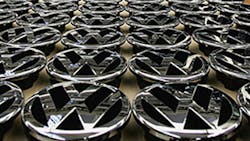VW Investors Should Be Wary of a Teutonic Tesla
FRANKFURT, Germany — In an attempt to move on from the diesel emissions scandal, Volkswagen announced a plan last week to sell up to three million electric vehicles a year by 2025 — or about one quarter of its projected sales.
Importantly, CEO Matthias Mueller also declared that battery technology would become a "new competency," and the carmaker had begun a review of its strategic options in the field. Mueller’s comments seemed to lend weight to recent German media reports that one of those "options" could be for VW to build a multi-billion euro electric vehicle battery plant. It's worth at least considering — the ambitious target means it will need to source an awful lot of batteries from somewhere.
Mueller should be commended for thinking big and for steering VW toward a cleaner future. Sometimes fortune favors the brave, as Tesla's Elon Musk has shown (so far, at least). Still, trying to manufacture lithium-ion batteries would entail huge risks for VW, whose balance sheet has already been weakened by the 16.2 billion euros ($18.31 billion) provision for diesel-related fines and recall costs. VW management should proceed with extreme caution.
To be sure, building the batteries would spare VW paying a supplier's margin on top of the basic cost of production. And the battery plant idea has a superficial public relations appeal. It would also doubtless help the German car industry wrest back some of the initiative from the handful of Asian companies that currently dominate the market for electric vehicle batteries.
Battery technology seems likely to displace the combustion engine and comprise a big chunk of the value of tomorrow's vehicles. German carmakers have arguably been too casual in leaving others to develop battery cells — there is a risk of an unhealthy and margin-diluting dependency.
However, given the technological head start enjoyed by the likes of Samsung SDI, LG Chem and Panasonic, there are reasons to think VW would struggle to compete, at least initially. Deutsche Bank analysts think VW might need up to 10 years to catch up.
Electric vehicle battery prices are already falling rapidly amid technological advances, aggressive price cuts and a surfeit of production capacity. That's good news for those hoping for rapid adoption of electric vehicles but not necessarily for the profits of companies that sell batteries. The Chinese government this year made supporting battery development a top priority, suggesting competition will only intensify.
Germany's solar industry — once dominant but quickly demolished by low-cost Chinese rivals — is a lesson in what can go wrong.
Mueller should therefore think twice before aping Musk, whose $5 billion battery plant — dubbed the Gigafactory — is currently under construction in Nevada. The German carmaker reckons it will require about 150 gigawatts hours of battery production capacity per year, which is about four times the size of the Gigafactory's cell production capacity.
One route could be for VW partner with another battery supplier (as Tesla has done with Panasonic) or team up with other German carmakers to build a battery plant — thereby mirroring the cooperative model the industry adopted to buy Nokia's mapping business last year.
But to break into such a competitive market, VW will also need a technological edge. Intriguingly in 2014 VW bought a stake in QuantumScape, which is working on so-called "solid-state" batteries that should help electric vehicles to drive farther before recharging.
Bosch, the privately held German car parts supplier, acquired a California-based solid-state battery supplier called Seeo last year. So perhaps Bosch and VW could join forces.
It's right that VW thinks hard about sourcing electric batteries, but building a factory on its own looks like a stretch too far.
Having sullied its reputation by cheating on emissions, VW need to avoid creating a white elephant with its efforts to make amends.
By Chris Bryant
